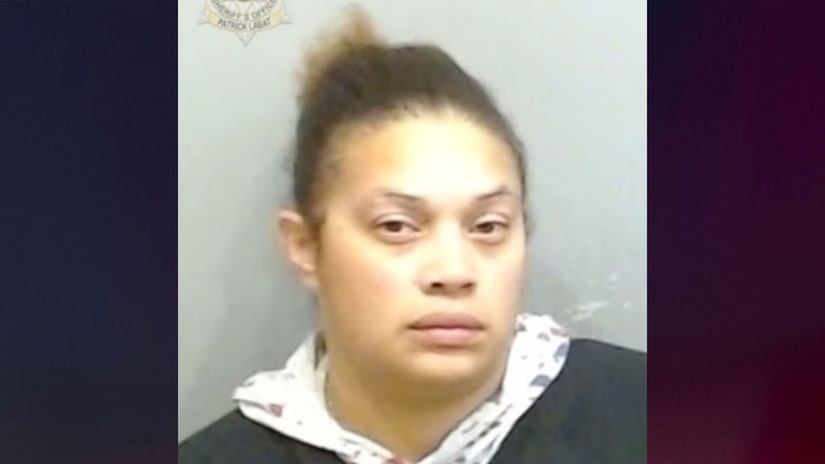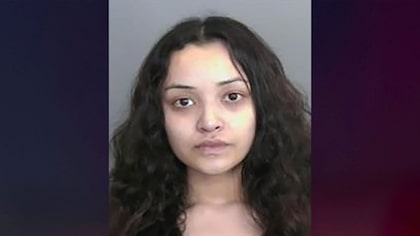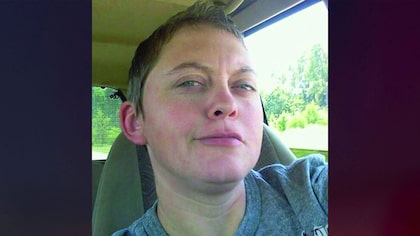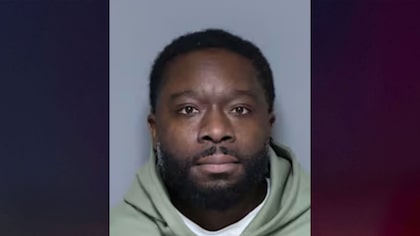Controversy surrounds police shooting recorded on body-camera in Arizona
01/04/2018 1:40 pm PST
The shocking police video is sparking nationwide debate: newly released body-cam footage of officers responding to a potential shooter in a hotel.
But did the response match the threat -- and does the punishment fit the crime?
Before the now infamous video, Laney Sweet shared a good life with her husband Daniel Shaver, the man she met when she was just 16.
"Yeah, we were really young," Sweet tells Crime Watch Daily. "We fell in love at a music festival called Bonnaroo at a Pearl Jam Concert, and after we came back we were just always a couple."
It was a bond formed over a shared love of music. But Laney Sweet says that it was actually their differences that helped keep them close.
"He just was naturally goofy, and silly, was very easygoing and laid back," said Sweet. "I'm more serious and like emotional. People say opposites attract, like we were each other's opposites."
But they were always on the same page when it came to their daughters Natalie and Emery.
"Danny loved his children and did everything he could for them," said Sweet.
But to provide for the family he loved, Daniel Shaver had to take a job that often took him far from home.
"His job was to go to warehouses, Targets, Walmarts, and get rid of vermin, pests and pigeons," said attorney Ben Meiselas.
"He was gone usually like 25 days a month and so he sacrificed almost all of his life and his time out there like making money just to give the girls things that he never had," said Sweet.
And so when Shaver got offered a job in Mesa, Arizona, even though it was nearly a thousand miles away from his home, he packed up the pellet gun he used for work and said goodbye to his family in Dallas. Once in Mesa, Shaver checked into a room at the La Quinta Inn. Sweet says they talked throughout the day. Less than an hour after they talked, Mesa Police dispatch received a call.
Dispatch: "911 emergency?"
Caller: "Hi, I'm with the La Quinta and a couple of the guests are coming -- I'm an employee here, they've come to me and they told me that somebody's pointing a rifle outside of one of the windows in our building."
"There were two individuals who were by the hot tub area who saw somebody in the room who they said believed had what looked like a gun," said Meiselas. "And they reported it to the hotel and then the hotel called the police."
The room in question was 502. And the person staying there?
Caller: "OK, his name -- yeah, Daniel Shaver."
Just three minutes after that 911 call, Officer Philip Brailsford responds to the hotel, his body-camera recording as he eventually joins the other officers.
Sergeant Charles Langley is commanding the team and tells Brailsford to provide lethal coverage.
Minutes after arriving, the team moves to the fifth floor, advancing to within just 20 feet of room 502. It is there where Daniel Shaver is believed to be inside with another hotel guest named Monique Portillo.
Officer Brailsford keeps his gun trained on the end of the hallway while Sgt. Langley stands right behind him just off camera. It is Langley's voice heard shouting commands in the minutes to come.
"Occupants of room 502, this is the Mesa Police. Listen to my instructions. I want the female to step out."
At first, no answer.
"Occupants of room 502, this is the Mesa Police. Listen to my instructions or it's going to become very uncomfortable for you."
Finally another officer calls Shaver's room from the front desk, and this time he answers.
"Hang on, they're coming out. All right, we have one coming out. Stop right there!"
Monique Portillo comes out first, stunned by what she sees.
"Monique, she has no clue what is going on. She keeps walking and then the officer starts screaming," said attorney Ben Meiselas.
"Stop!"
Daniel Shaver is next.
"Stop, get on the ground, both of you! Lay down on the ground! Lay down on the ground!"
"He comes out. He sees the officers with these guns trained on him," said Meiselas. "And so what you see on the video is it going from confused to fearful."
"Can you both hear and understand me? All right, if you make a mistake, another mistake, there is a very severe possibility that you're both going to get shot. Do you understand that?"
"Shut up. I'm not here to be tactful and diplomatic with you. You listen. You obey. Young lady, shut up and listen."
After that, Sgt. Langley orders Portillo to crawl toward the officers before turning his attention back to Shaver.
"OK young man. You are to keep your legs crossed, do you understand me? You are to put both of your hands palms down straight out in front of you. Push yourself up into a kneeling position. I said keep your legs crossed!"
"When you watch the video, he goes from very compliant, he's just trying to get across to the officers that he's listening, that he is obeying, and at some point though you see Daniel break down," said Meiselas.
"You do that again, we're shooting you. Do you understand?"
"Please do not shoot me!"
"Then listen to my instructions!"
"OK, I'm trying to just do what you say -- "
"Don't talk, listen! Hands straight up in the air. Your hands go back into the small of your back, or down, we are going to shoot you. Do you understand me?"
"Yes sir!"
"Daniel Shaver in the video is crying and begging for his life. He's saying 'Please don't shoot me,' and then they say 'Crawl forward,' and they scream at him, 'Crawl forward,'" said Meiselas.
"Crawl towards me!"
Warning: What happens next is extremely disturbing.
"He's crawling forward and he's wearing baggy basketball shorts, and his hand goes slightly up to readjust his shorts," said Ben Meiselas.
"Don't!"
"And that's when they open fire," said Meiselas.
Five shots from Officer Philip Brailsford's gun in eight-tenths of a second. And Daniel Shaver falls dead. Later, officers discover Shaver is unarmed.
There's no disputing that the manner of Daniel Shaver's death was homicide. The question is, at least in the eyes of the law: Was it justified?
How did this unarmed, 26-year-old father of two go from hanging out in his hotel room to dead in the hallway?
On the night of January 18, 2016, Daniel Shaver, 26, befriended two hotel guests on the way to his room: a man named Luis Nunez, and Monique Portillo.
Just after the shooting, Portillo tells police that an hour earlier Shaver had invited Nunez and her to his room for a nightcap. Portillo says while in the room, Nunez asked to see the pellet gun Shaver used for work. Unbeknownst to them, a couple downstairs saw the gun near the window and had the hotel call police.
"Did he ever point it at you or threaten you?"
"No, he didn't."
Shortly after that, Portillo says Nunez left the room to use his phone. And the next thing she knew?
"You guys called and that's when that guy said, he's like, 'Hey, it's the police, they want us to go outside.'"
"OK, then what happened?"
"They shot him."
The next morning, Laney Sweet can't reach husband Daniel Shaver.
"For him not to answer my call when I was taking the kids to school, which was our everyday normal, I mean I knew something was wrong immediately," said Sweet.
Sweet says she contacted police, but got nowhere, which led to a terrifying thought and a desperate call.
"Eventually I had the intuition to call the medical examiner, I gave them his name and date of birth and they said that they had a file," said Sweet. "I just started saying 'No,' and then I just remember hearing whatever Disney movie was in the background, and then that moment that that first hit me where I realized, 'Oh my God, my kids just lost their dad and I have to tell them.'"
Their lives changed forever.
Approximately two months later, Officer Philip Brailsford's life also changed. In a surprise move, he's suddenly charged with Daniel Shaver's murder.
"This was absolutely murder, and I think it was cold-blooded murder," said Shaver family attorney Ben Meiselas. "Daniel Shaver in the video is crying and begging for his life, he's saying 'Please don't shoot me.' It should tell the police officers who were there that he posed no threat."
But Brailsford's lawyer Michael Piccarreta says when it comes to police shootings, it's not that simple.
"There's no rule of the street where the suspect says 'Don't shoot me,' and the officers go 'OK, that's the rule, we put our guns away.' It doesn't work that way," Piccarreta tells Crime Watch Daily. "Deadly force is justified when an officer reasonably believes that there's an imminent threat of death or serious injury."
Piccarreta says it's not the actual threat that matters, but the perceived threat, which in this case was Brailsford's belief that Shaver was reaching for a gun.
"An officer doesn't have to wait until they see the cold glint of steel or muzzle flash to react," said Piccarreta. "And someone makes a motion consistent with drawing a weapon, they have to react."
But Crime Watch Daily brought in a police training consultant who questions why Shaver was in that position in the first place.
"If they would have had Shaver come out, put his hands up, do a 360, even to the point of lifting up his shirt so they could see his waistband, I think things could have changed drastically once Shaver was down on his knee. There wouldn't have been such a huge I think threat to the officer, knowing that there wasn't anything in his waistline," said law enforcement expert Harlan Waugh.
And attorney Ben Meiselas, who has also filed a wrongful death lawsuit on behalf of Laney Sweet, claims there were many ways officers could have de-escalated the situation.
"They could have listened to him," said Meiselas. "There's no police training out there that says you give these commands so in your face, dominant."
He says instead, Sgt. Langley, the one heard shouting commands just off-camera, escalated things, and created the dangerous situation that led to Officer Brailsford's perceived threat.
"What he says is 'If you make any mistake, we will treat your mistake as a threat and we will likely shoot you,'" said Meiselas.
"You may not survive. Do you understand me?"
"That absolutely goes against any police protocol. Making a mistake to this ridiculous and hard game of 'Simon Says' that Sgt. Langley was playing, is not grounds, does not give justification for the shooting that takes place," said Meiselas.
And as for the movement that led to Shaver's shooting? It happened as he approached Monique Portillo's bag, left in the middle of hallway on the floor.
"I think when Shaver went for his hip it looked like he was going to pull up his pants, which is instinctual," said Harlan Waugh.
"But who knows that?" said Michael Piccarreta. "You're sitting there in the moment after the fact, everyone goes 'Oh, he must have been pulling up his shorts.' They say that because now they know there was not a firearm. The decision has to be made before you know that."
"Deadly force is absolutely supposed to be the last option," said Meiselas. "Here, not only did it appear to be their first option, they were going to shoot to kill him the moment Sgt. Langley started barking those outrageous and horrible commands."
Meiselas also questions why Brailsford, with just two years on the force, was providing lethal cover.
"Here in Philip Brailsford we had a 25-year-old kid who had prior excessive-force incidents before this," said Ben Meiselas.
In fact, though he was ultimately cleared, Brailsford had been investigated at least three times before for using an inappropriate amount of force.
On the night of the shooting, Brailsford was armed with his personal AR-15 assault rifle, which was allowed by the Mesa Police Dept. But it's what was etched on Brailsford's gun cover that really raised eyebrows.
"The etching on the AR-15 says 'You're [----]ed' on it," said Meiselas.
"Told me that, you know, he was aggressive. Police officers used to and there are some are still called 'peace officers.' There is nothing peaceful about that inscription," said Daniel Shaver's widow Laney Sweet.
"If you're willing to etch that into your gun, you view your job as a police officer like a video game, a first-person shooter," said Meiselas.
But what will a jury think, and will they hear the whole truth?
Was the person who killed Daniel Shaver a trigger-happy cop or an officer afraid for his life? Nearly two years after the shooting, the second-degree murder trial of Philip Mitchell Brailsford begins.
"The state is going to show that the defendant was not acting like a reasonable officer would act. He was acting like a killer," the prosecutor stated in court.
"The prosecution's theory is they felt that he did not reasonably believe that under the circumstances deadly force was necessary," said Brailsford's attorney Michael Piccarreta.
And to prove it, prosecutors call in Detective Paul Sipe, who was assigned to investigate the shooting. Sipe testifies that after watching the video, he didn't see the imminent threat needed to justify Brailsford shooting.
But the defense called its own crucial witness -- the man at the center of it all. Brailsford says the stage was set when officers got the call of a potential shooter in room 502.
"That set the whole tone. A 'man with a gun' call high up in a hotel set the whole tone for the evening," said Piccarreta.
Piccarreta: "Based on your training do you believe them to be armed until determined otherwise?"
Brailsford: "Absolutely."
Piccarreta: "Now as coverage officer, what was your role?"
Brailsford: "I had one role, and it was a simple role. I'm responsible for everyone else, including myself, and I need to keep the scene safe."
He says that's what was going through his head when Daniel Shaver was in that hallway.
Piccarreta: "At this point what are you focused on?"
Brailsford: "Focused on the hands."
Piccarreta: "And why?"
Brailsford: "The hands are what kill us. We're trained that if any action is going to be had against you, it will start with the hands."
It's why he says he made that split-second final decision.
Brailsford: "Moving directly to the side, it looked exactly like someone was drawing a pistol. We are trained that we cannot wait until the gun comes into view."
"You learn, had you been at the trial, that he followed his training 100 percent," said Piccarreta.
And to prove it, Brailsford's defense team brought in the police academy instructor who trained him.
"The hands are what are going to hurt us or kill us, so what we teach on this is that what you have to look at," said police academy instructor Jeff Jacobs.
"When the trainer tells the jury that 'I trained him in this exact situation to do exactly what he did,' I think that was persuasive, but I think that's the heart of the corruption here, because that training is wrong. You're taught that you need to be trained to literally shoot to kill anybody if you have even a slight fear, and that would be justifiable. That's not how you train an officer to act reasonably," said Ben Meiselas.
Shaver's widow's attorney says Brailsford's fear was unreasonable, and when officers saw Shaver begging for his life, they should have de-escalated the situation.
"There were so many times where he clearly submitted, where he laid on the ground, even when he put his hands behind his back, he wanted them to cuff him to defuse the situation," said Meiselas.
To that end, Brailsford's lawyer says it was never his client escalating the situation in the first place. Remember, it was Sgt. Langley shouting the commands, not Brailsford.
And what about that commanding sergeant we hear on the video? Though he has since retired from the force and moved to the Philippines, at a pre-trial hearing months earlier, Langley took the stand to defend his actions and Brailsford's decision to fire.
"I looked at him and I just thought 'Gun.' 'Gun.' I remember that at that point I thought that we were going to get shot. I thought I was going to get shot," said Langley.
In fact, Langley says there's only one reason he didn't fire first.
"I realized that I can't make the shot because Officer Brailsford is directly in front of me," said Langley.
His conclusion? Brailsford acted as any other reasonable officer would have.
"I believe now that he was protecting the team," said Langley.
"I think that officers are trained to say that they perceived a threat," said Laney Sweet. "Whether any of those officers truly perceived a threat, I don't know. There were six there and only one opened fire. I think speaks for itself."
And it's true, another officer on scene that night, Brian Elmore, also seen on body-camera, testified that he didn't see the threat Brailsford did.
"The other officer said 'I quite possibly would've fired, but I never lost sight of the hand,'" said Piccarreta.
Either way, Brailsford's attorney says his client never wanted to shoot Daniel Shaver, and that the proof is in the video, as seen in a frame-by-frame analysis presented in court: Brailsford's finger is off of the trigger until the very last second.
"Mitch Brailsford did not make the decision to shoot until the gentleman's hand moved out of his sight to his side," said Piccarreta. "At that moment the video shows his finger for the first time, moved inside the trigger guard."
"I absolutely 100 percent believed he was reaching for a gun. I would not have fired my weapon at all if I thought otherwise," Brailsford testified.
But would the jury see it that way? Finally, after six weeks of testimony and two days of deliberations, the verdict:
"We the jury do find the defendant Philip Mitchell Brailsford on the charge of count one, second-degree murder, not guilty."
And it was not guilty on a lesser charge of reckless manslaughter as well.
"The jury was basically pushed to believe 'If you believe he followed the training and protocol that he was given at the Mesa Police Department, then you must acquit,'" said Ben Meiselas.
DASH'S DOCKET: WHEN DEATHS CAUSED BY POLICE SHOOTINGS ARE LEGALLY JUSTIFIED
Since the shooting, Philip Brailsford has been fired from the force for unrelated reasons -- though Laney Sweet says it's of little consolation.
"Why can he not tell my family 'Sorry.' I'll take that," said Sweet. "Anything, I mean just, 'I'm sorry for the pain you feel.' I've never gotten that from him."
Crime Watch Daily did reach out to Philip Brailsford for comment, but he declined to comment at this time.
"He feels that, you know, he's testified in court, he told his story, the jury heard the story, found him not guilty, and he's said what he has to say," said Piccarreta.
After the trial, Sweet and her attorneys decided to release the full uncut body-cam footage to the public with the hope that the U.S. Department of Justice will step in and take action.
In addition, Laney Sweet has filed a civil lawsuit against Brailsford, Langley and the city of Mesa, Arizona. Those named in the suit have filed a motion to dismiss.
While holding out hope for justice, Daniel Shaver's family honors his memory with good deeds, asking others to pay his legacy of selflessness forward.
"If we can get officers held accountable for unjustified shootings, I think that Daniel wouldn't have died in vain," said Laney Sweet.
If you'd like to donate to Daniel Shaver's family or learn more about their pay-it-forward goals, visit the "Justice for Daniel Shaver" GoFundMe and Facebook pages.





